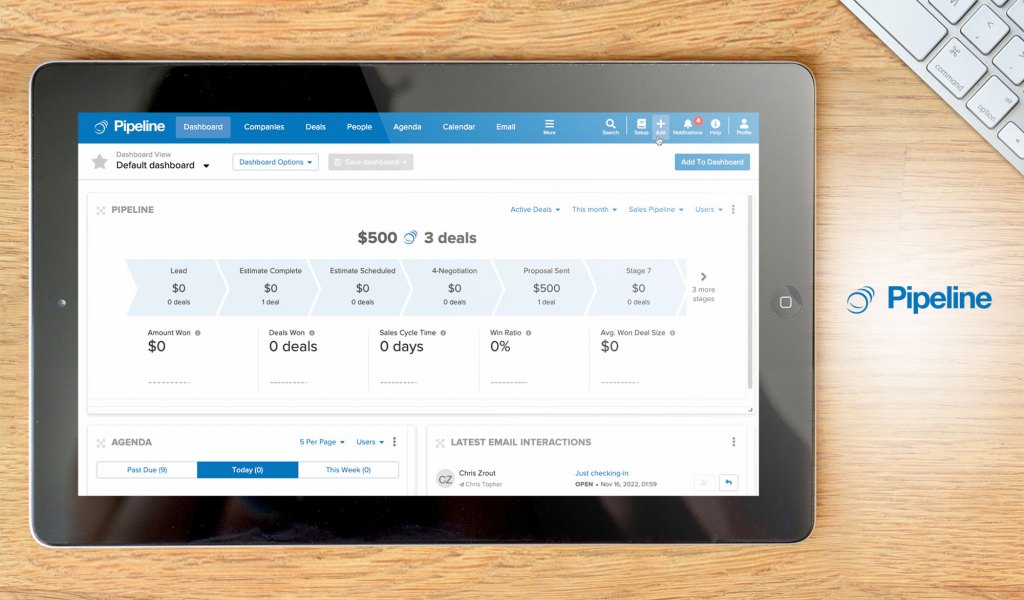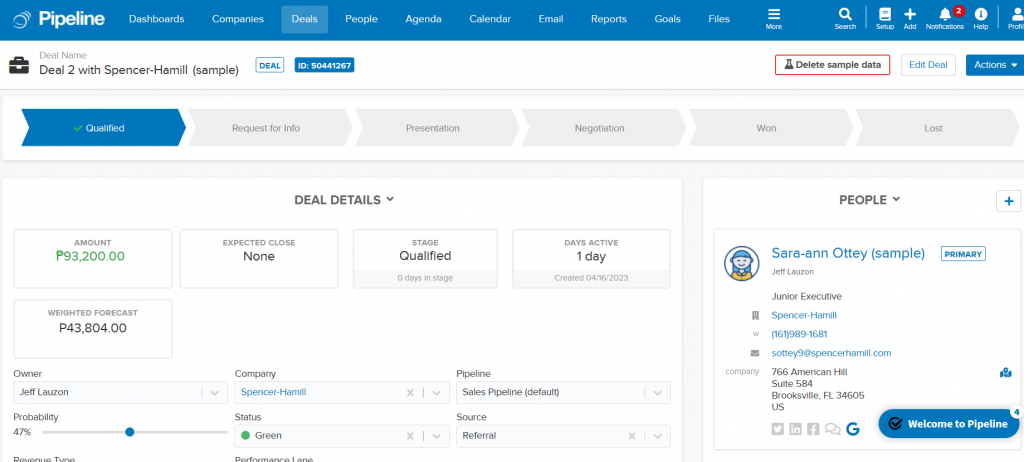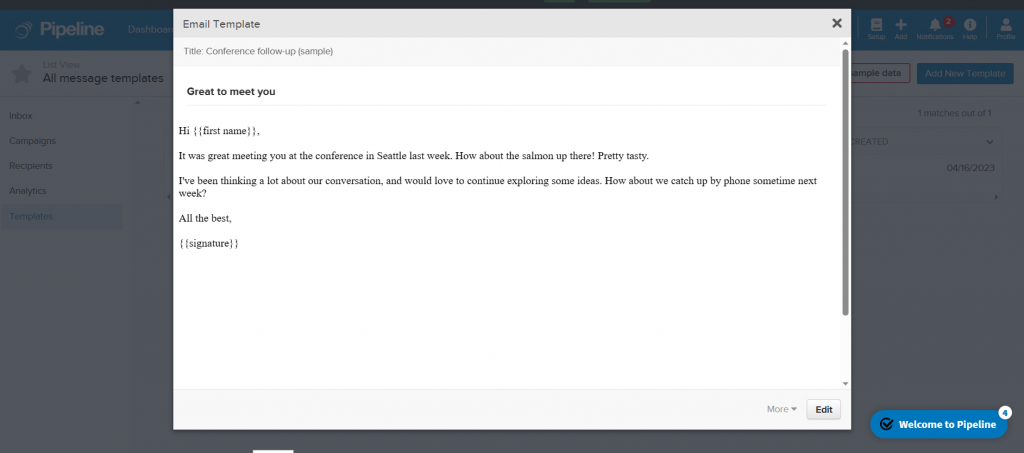While generic CRM solutions can help businesses improve sales performance, they are not truly built for sales use. They usually don’t include important sales features such as commission tracking, forecasting, and deal management. This is why sales CRM solutions are in demand nowadays, as they combine the best CRM features with specialized sales tools designed specifically for the sales function. One of the most well-rounded sales CRM solutions around is Pipeline CRM, a software billed as having been made by salespeople for salespeople.
It cleverly mixes CRM tools with sales workflow support features and advanced sales analytics capabilities. As such, it has become a go-to software for many sales teams. And it is quickly getting adopted by more small and medium-sized businesses. It is popular among fencing contractors, wholesalers, construction companies, and professional services. It is also used by enterprise-level organizations such as FujiFilm.
As good as the software is, like any digital tool around, it is not perfect. This is the same with Pipeline CRM. While it offers a great combination of CRM and sales tools, it is more sales-specific. As such, some prospective users may find it quite limited for general CRM use, causing them to stack it with other solutions. In this article, we will unpack the pros and cons of Pipeline CRM to give you a better idea of what it is truly meant for and how you can get the best out of the software.

Pros & Cons of Pipeline CRM Table of Contents
Adopting a sales CRM can help users improve team management and sales performance. It has been found that proper software use can increase sales productivity by 50% and conversions by 300%. This does this in a number of important ways. Firstly, it provides ready-to-use digital workflows to help users organize tasks. Secondly, it generally comes with communication tools that make for real-time customer engagement. Thirdly, such a platform has collaboration tools, allowing teams to be on the same page. Fourth, it usually comes with analytics tools that give teams real-time visibility of key performance metrics to help users make data-driven decisions. No wonder many businesses, big and small, today are using CRM software.
Key CRM Software Use Statistics
Source: McCain, 2023
Designed byWhile it is typically used in after-sales support, there are CRM platforms that are specifically built for other business functions like marketing and sales. This is because providing a good CRM experience to customers in these areas can help businesses increase their key metrics. Studies find that it can improve productivity and even secure an ROI of $8.71 per dollar spent. As such, the demand for more specialized CRM solutions is increasing.
Because of the rapid growth of this software segment, recent customer service statistics show that experts predict the market to reach $43.5 million by 2024. This growth rate indicates that having a CRM solution is and will be the norm. Thus, a business without one will have a significant disadvantage, especially with the on-demand climate nowadays. Fortunately, many organizations have realized this; and since the COVID-19 pandemic have been scrambling to find the best solution for them. And for sales CRM particularly, one good candidate is becoming quite popular among SMBs, Pipeline CRM.
Overview of Pipeline CRM

Pipeline CRM is a specialized CRM software solution for sales teams. It is uniquely designed by salespeople for salespeople. As such, it is fitted with sales-specific tools and workflows that have been tested and proven to optimize sales processes. Key features include contact management, lead management, team management, and deal management. The product also packs advanced sales monitoring tools besides the usual analytics package. These include features for commission tracking, sales forecasting, and sales performance monitoring. And it is definitely one of the best around today, especially SMBs.
The product is also customizable. It allows users to create custom deal stages, custom data views, and, of course, make the aesthetics fit their branding by adding their company logos and colors. Moreover, Pipeline CRM has automations that can help optimize sales processes. Also, Pipeline CRM can be configured to manage clerical yet critical tasks such as providing activity reminders and status updates.
Other features include email campaign management, file storage, and user account permissions for role-based management. The CRM platform also has a good set of integrations. While it may not have a very long list of built-in integrations, it has one for Zapier that allows you to create custom cross-application automations. It has built-in integrations with popular third-party tools such as MailChimp, Excel, and the Google Apps suite. Furthermore, you can access the Pipeline CRM through mobile via its apps for both Android and iOS devices. The software provider is known for its stellar customer service, including personalized onboarding services. Lastly, pricing starts at $25 per month.
Detailed Pipeline CRM Review
Key Features of PIpeline CRM
- Sales Pipeline Management
- Sales Team Management
- Email Campaigns & Tracking
- Commission Tracking
- Goal Tracking
- Sales Forecasting
- Sales Performance Monitoring
- Lead Management
- Contact Management
- Custom Deal Stages
- Reporting and Analytics
- File Storage
- Account Permissions
- Smart Agenda
Pros and Cons of Pipeline CRM
Provide maximum visibility of sales pipelines
Pipeline CRM has an extensive sales pipeline solution. It provides 360-degree visibility into deal stages, goals, and team performance metrics. As such, you will always have a good overview of your sales operations. Moreover, Pipelie CRM allows for a good degree of flexibility, letting you view any custom data point you want. It has a comparison charts tool for viewing what kinds of leads or team members that are successful. It has real-time viewing capabilities for activities and can generate accurate sales forecasts. You can present all of these on a central hub to keep everyone on the same page all the time.
With regard to pipeline and sales operation visibility, Pipeline CRM truly does what it says it does and even more. Having first-hand experience, we can attest that it offers one of the best, if not the best, sales pipeline management solutions on the market. As such, it is imaginable that it can overtake some of the best digital sales tools for SMBs in the long run. It is that competitive. And, regarding its sales pipeline feature, it is arguably far superior to other more established products.

A screenshot of the deals view showing the status and financial information relevant to a particular deal.
Streamline sales processes
Aside from its built-in workflows for pipeline management, Pipeline CRM has automation tools for clerical tasks such as status updates and activity notifications. With these, users will be able to concentrate more on the actual sales process rather than the menial aspects of the management side of it. The software is powerful enough to make “next step” suggestions, prompting team members to move on to the next phase of a deal. This helps salespeople remain on track and be armed with the knowledge of what is the best next course of action.
Also, Pipeline CRM can be configured to automatically facilitate task management and update as they move through your sales pipelines. Pipeline CRM also has a neat feature for managing recurring deals. Unlike other generic CRM tools, it supports workflows for retainer revenue models. As such, it is a great option for improving B2B sales.
Nothing negative can be said about Pipeline CRM in this area, except that it is highly specialized for the sales process and does not translate well to other business functions where a CRM tool can also be helpful. This is the general knock on this product, but it is to be expected for something being marketed as a sales CRM. So, no issues here whatsoever.
Enhance and maintain customer relationships
What Pipeline CRM really does to help businesses enhance and maintain customer relationships is provide sales team management support. This allows team members to focus on the actual building and fostering of good customer relationships and closing sales. It, however, does not directly provide traditional CRM tools for digital engagement, such as hybrid chat, social media, and phone support. It can only provide these via integrations with other solutions that do so. So, it is really far from a traditional CRM solution.
But, again, it is, first and foremost, a sales tool. And it functions at a slower timescale of closing deals rather than rapid-fire after-sales customer support. It is plainly not made for the latter. Also, the platform’s main target customers are sales-driven SMB operations that do not really need real-time engagement solutions. Pipeline CRM is really best for businesses that conduct offline sales deals. Agencies, plumbing and HVAC services, construction companies, and other professional services mainly use it. But should you need traditional CRM engagement tools, you can easily integrate Pipeline CRM with such solutions using Zapier.
Send and track sales emails
One thing that resembles a traditional CRM engagement function is its email campaign tool for sales and marketing. This is complete with tracking capabilities, allowing users to view how many people have opened their emails and whether links or attachments were accessed. Plus, it comes with a leads prioritization feature where leads that have opened your email are listed before other recipients, separating warm leads from cold ones. So, with this included, you don’t really have to invest in email marketing solutions. And what’s great about it is that it is directly connected to your sales workflow. Now, you can avoid the import/export troubles associated with using another software tool.

A screenshot of the email template feature on Pipeline CRM. This allows you to create and send marketing and sales follow-up emails.
Make data-driven decisions for sales management
Pipeline CRM has a deal insights feature powered by AI, to help you generate ideas for improving your sales strategies. The platform summarizes your deals through graphic visualizations, making complex sales operations data digestible. It is also highly customizable, and it allows you to see what works and what doesn’t for closing deals. With this, users can uncover optimization opportunities and make better data-driven decisions.
Via combined use with other reporting tools on the platform, you can create custom reports to drill down into various aspects of your sales operations. And, for SMB or team-style sales management uses, its analytics package is very comprehensive. In fact, it is one of the best so far. It is simple and highly configurable. So, you can view any custom data point and bring seemingly unrelated data to bear on other information should you need to.
Pipeline CRM works seamlessly with other reporting solutions as well, such as QuickBooks and Excel. So, the sky is really the limit when it comes to sales reporting. The only potential issue here is while it provides you with general insights, users need to have the intuition, skills, and know-how for creating high-level specific reports. Like any software tool, it is only as good as those who wield it.

A screenshot of the deals by stages report on Pipeline CRM.
Improve sales team management and communication
Pipeline CRM offers sales managers tools for goal setting and monitoring. These are useful for guiding team members in hitting their marks and meeting team quotas. Features include goal tracking and custom activity setting with activity grouping features. It also has activity reporting available, complete with a line chart visualization for an intuitive understanding of operations progress. Furthermore, it also has built-in collaboration tools, including a file storage feature. With this, all relevant information for deals and pipelines will be easily accessible right on the platform. These sales management tools can help eliminate inaccuracies, redundancies, confusion, and delays.
Additionally, Pipeline CRM has an email sync feature that helps users send, receive, and track sales emails. As such, users can avoid switching between apps to manage emails or simply view full sales communication history.
The solution, however, lacks advanced project management tools like those of standalone project management platforms. But, for sales management at the scale of small and medium businesses, the ones found on Pipeline CRM are more than enough. Also, through its Zapier integrations, you can extend its functionality and scope.

A screenshot of the goal-setting menu on Pipeline CRM. This is where sales managers can set team-wide and personal objectives.
Create custom sales processes for your team
Every organization is different and can have multiple ways they go about sales. With Pipeline CRM, users can customize their deals and sales stages to mimic their actual sales processes. It supports the use of multiple sales pipelines in case you have different workflows for different products and services. This is helpful to companies with a wide range of product lines and service offerings like HVAC installation and repairs, ad agencies, and contractors.
Moreover, you can also configure pipelines to include post-sales delivery and support. Its deal profile page feature comes with comprehensive tracking tools, including those for custom parameters you wish to add. This, when used properly, can help predict future deal outcomes, set realistic quotas, and view the patterns of what makes deals successful. Hence, you won’t go at building your sales processes blind. You can optimize along the way using data-driven insights. And this is a feature that is unique to the product. Not all sales CRM solutions provide the same depth when it comes to pipeline customization and analytics. As Pipeline CRM is highly customizable, businesses can make it truly their own.

Track your tasks and schedule using Pipeline CRM’s calendar view.
Can Pipeline CRM really make a difference for you?
As you have seen, Pipeline CRM is a highly-specialized CRM platform for sales with everything SMBs need to succeed. It is even comprehensive enough to support team-style enterprise-level sales operations. This strength, however, looks to be a weakness from a certain angle. Pipeline CRM is simply not your generic CRM tool, as it lacks the built-in capability for flexible omnichannel customer engagement. It functions on a slower timescale based on offline sales deals rather than the faster timescale of customer support. So, it doesn’t really translate well outside of the sales function. But as the label reads, Pipeline CRM is a sales CRM. And in this regard, it truly delivers.
Below are two areas where we consider Pipeline CRM to be the most useful. If you think these areas are crucial to your success, then Pipeline CRM should be a good fit for your company.
Managing a deals-based sales operation
For deals-based sales operations, Pipeline CRM might just be one of the top software choices today. It comes with a wide variety of functions with a great degree of customizability, more than enough to fashion the platform to work particularly for your own offline sales workflows and actual deals pipeline. It is not only fitted with tools you expect to have in a sales CRM software but also tools you didn’t know you needed. These include powerful deals insights for opportunities slipping away and customer health status. These helpful features give users a nudge to move the deals they work on up the pipeline, increasing productivity. This makes Pipeline CRM one of the best options for deals-based sales management.
A data-driven approach to sales
Another thing that really stands out is its comprehensive reporting and analytics package that rivals some of the most reputable standalone business analytics solutions. It has tools to create custom reports and dashboards, making it an excellent option, given its advertised scope. Its reporting package is, generally, very intuitive. But, much like advanced analytics platforms, you need good skills and intuition to get the most out of it. Note, however, that it already includes comprehensive sales reports on hand. These include sales forecasting, activity tracking, and customizable comparison charts. Moreover, it also has foreign currency tracking capabilities for international sales operations. These give Pipeline CRM’s reporting package high out-of-the-box usability. And this is essential for any sales manager that values a data-driven approach.
The Verdict
Based on the Pipeline CRM pros and cons above, overall, it is an outstanding solution for sales teams. From how it works, you can see that it has been designed by other salespeople based on tested and proven practices. While the product can support enterprise-level sales team operations, it really works best for SMBs. From our first-hand experience with Pipeline CRM, it is truly one of the best sales CRM options out there today. It has a good mix of built-in workflows and customization options. The former can nudge you towards productivity through best practices and streamlined processes. The latter allows you to fashion the platform to fit evolving needs. So if you are looking for a sales CRM solution, you won’t go wrong with Pipeline CRM. It might be a relatively newer name, but it is as good as the more popular solutions.



























Leave a comment!